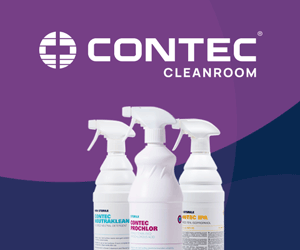Kenall Manufacturing, a US manufacturer of specialised lighting products based in Kenosha, WI, has launched Indigo-Clean, a light fixture that uses continuous environmental disinfection technology to continuously kill harmful bacteria linked to hospital acquired infections (HAIs). The technology behind Indigo-Clean inactivates a wide range of micro-organisms that are known causes of HAIs, including MRSA (Methicillin-resistant Staphylococcus aureus), C.difficile and VRE (Vancomycin-resistant Enterococcus).
Indigo-Clean is a light fixture manufactured through an exclusive licensing agreement with the University of Strathclyde in Glasgow, Scotland, which developed and patented the technology. The light operates continuously and requires no operator, kills bacteria in the air and on all surfaces, and complies with all internationally recognised standards for patient safety. The product was unveiled before the annual meeting of the Association for Professionals in Infection Control and Epidemiology (APIC) in Nashville, TN in the US.
'Indigo-Clean represents a breakthrough in helping to reduce HAIs,' said Jim Hawkins, CEO of Kenall. 'It bolsters current disinfection efforts by infection preventionists and environmental services professionals in the fight against HAIs.'
Indigo-Clean uses a narrow spectrum of visible indigo-coloured light at an output of 405nm on the light spectrum. This High-Intensity Narrow Spectrum (HINS) light is absorbed by molecules within bacteria, producing a chemical reaction that kills the bacteria from the inside as if common household bleach had been released within the bacterial cells. Because the light is visible, it is lethal to pathogens but is safe for use in the presence of patients and staff.
Indigo-Clean represents a breakthrough in helping to reduce HAIs
'As part of Strathclyde’s clinical engagement in the UK over the last seven years, this technology has proven effective in killing bacteria in hospital settings. We are proud that the University of Strathclyde selected Kenall to commercialise this in the US,' said Cliff Yahnke, Kenall’s Director of Clinical Affairs. 'Breaking the chain of infection, from an infected patient, to the environment, to new patient, is vitally important, and the ability of this technology to be in use and effective at all times, will make a huge difference.'
Strathclyde’s technology has been in use since 2008 at Glasgow Royal Infirmary, a large teaching hospital operated by NHS Greater Glasgow and Clyde. The University gained a US patent on the technology last year and recently granted Kenall licensing rights for the North American healthcare market.
The team at Strathclyde is based within the Robertson Trust Laboratory for Electronic Sterilisation Technologies (ROLEST).
'We have spent more than 13 years researching and developing HINS-light technology for the purpose of reducing the environmental transmission of pathogens and ultimately reducing HAI in the healthcare setting,' said Scott MacGregor, ROLEST Founder/Co-director and Vice-Principal of Strathclyde.
'Our partnership with Kenall in the US is an exciting new chapter which will see this innovative technology become a commercially available product. We chose Kenall because of its extensive experience in providing lighting for the most challenging healthcare environments where infection prevention is a key consideration.'
Kenall, which completed a new state-of-the-art manufacturing facility just north of Chicago in late 2014, is poised to start commercial production of the technology immediately.




